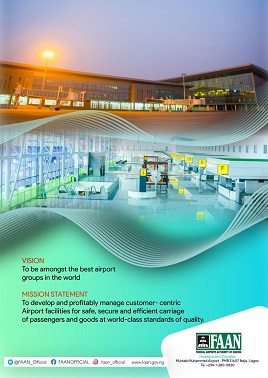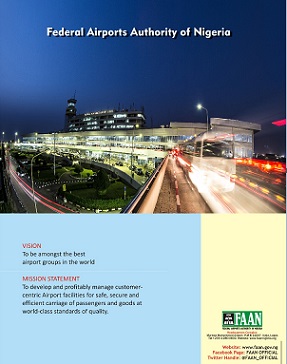
Managing Director,
Federal Airports Authority of Nigeria (FAAN)
The Managing Director/ Chief Executive, Federal Airports Authority of Nigeria (FAAN), Mrs Olubunmi Kuku has vowed to reduce the cost of energy consumption across all airports under her watch by 40 percent.
She said some initiatives are already in place to achieve the goal within a very short period of time.
Kuku in an exclusive interview with African Business Travel News (ABTNEWS) via a questionaire, agreed that FAAN, in comparison with major industrial plants, faces energy demands across its airport network, saying that the management of the West African largest airport network must embrace initiatives that will result in reducing significant energy expenditures.
To reduce the huge part of FAAN’s revenue spent on energy bills, the helmsman at FAAN believes there is the need to address the cost while reliability and sustainability are not compromised.
she disclosed that about four initiatives are being put together to address the energy challenges and the cost of energy consumption by her administration in FAAN.
She said one of the initiatives which are going to be in phases, is the conversion of the diesel powered 13MW Independent Power Projects IPPS operated by FAAN at Nnamdi Azikiwe International Airport, Abuja, from diesel to natural gas.
“The majority of FAAN’s IPPs and generators currently rely on diesel. However, we are actively working on transitioning to cleaner alternatives. A select team of energy experts at FAAN recently completed a report on converting the existing 13MW IPP at Nnamdi Azikiwe International Airport, Abuja (NAIA), from diesel to natural gas. This conversion aims not only to reduce our energy bills but also to align with the Airports Carbon Accreditation (ACA) Programme for sustainable airport operations,” she said.
She also said this will also be extended to Murtala Muhammed International Airport Lagos, Port Harcourt International Airport and Enugu International Airport, Enugu because of their proximity to the source of reliable supply of the natural gas.
“Plans are underway to establish gas-powered IPPs at Lagos, Port Harcourt, and Enugu International Airports, leveraging these locations’ proximity to reliable gas supplies,” she disclosed.
Beyond natural gas, she said, FAAN is exploring other clean energy sources such as solar, battery energy storage systems among others to power its airport infrastructure across the country
“Our energy leaders have recommended deploying solar farms and battery energy storage systems (BESS) at Kano and Lagos airports. These projects are designed to diversify our energy mix and enhance sustainability.” adding, “FAAN has made significant strides in managing carbon emissions, setting reduction targets, and implementing effective carbon management practices. Notably, in April 2024, FAAN achieved Level 2 Airport Carbon Accreditation, demonstrating our commitment to reducing our environmental impact.”
The FAAN Chief Executive also said that her management team is in discussion with Rural Electrification Agency (REA) to explore possible collaboration on energy production at primary and secondary airports to reduce reliance on diesel by introducing solar and wind energy solutions.
“We are in preliminary discussions with the Rural Electrification Agency (REA) to explore collaborative opportunities for energy production at both our primary and secondary airports. This partnership has the potential to reduce our reliance on diesel by introducing solar and wind energy solutions.
This approach, she noted “will not only reduces operational costs but also positions us as a leader in environmental stewardship within the aviation sector.”
Also in line with the Federal Government’s Presidential Initiative on Compressed Natural Gas (Pi-CNG) 2024, Kuku said her management is keen on integrating CNG-powered vehicles into FAAN’S operations. “We have recently concluded procurement processes for CNG buses, which will soon serve passengers at the Abuja and Lagos International Airports. We anticipate a significant rollout of CNG-powered buses and taxis in the coming months, which will contribute to lowering operational costs and emissions.”
With the above initiatives in place and well executed, Kuku concluded, “it is estimated that FAAN would be saving between 30-40% from our current expense on electric bills, diesel and petrol.”








